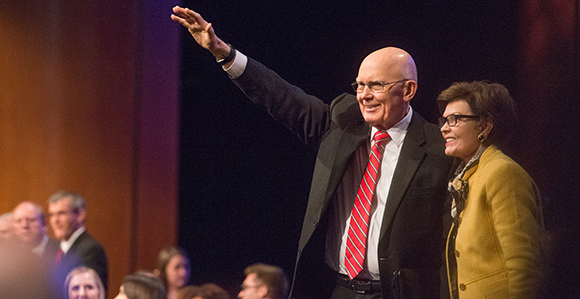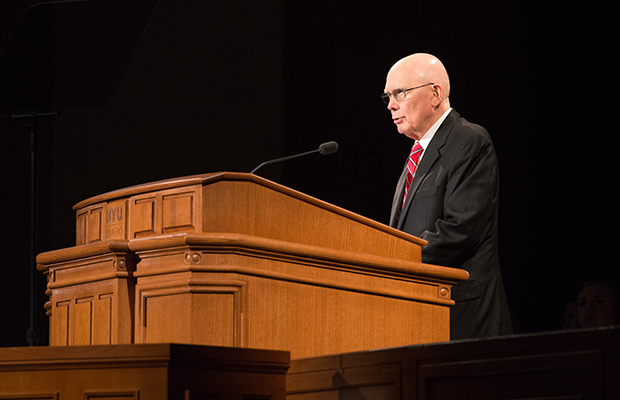We Must Both Live God’s Law and Love Those Who Don’t, President Oaks Shares
Contributed By Marianne Holman Prescott, Church News staff writer

President Dallin H. Oaks of the First Presidency and his wife, Sister Kristen M. Oaks, wave to students at a BYU–Idaho campus devotional on October 30.
Article Highlights
- The doctrine of Christ requires us to both live His law and love all people as He would.
- We can do this by continually showing love as we keep the commandments.
- Remember that all men and women are God’s children.
“To balance our commitments to love and law we must continually show love even as we continually honor and keep the commandments.” —President Dallin H. Oaks of the First Presidency
Related Links
Like two sides of a coin, love and law are able to coexist, President Dallin H. Oaks of the First Presidency told Brigham Young University–Idaho students during a devotional on Tuesday, October 30.
“Those who honor God’s commandments may be seen as not having love for those who do not follow His laws,” he said. “Conversely, reaching out in love and kindness can at times be seen as condoning choices that are contrary to God’s laws.
“However, these seemingly contradictory ideals are in fact a paradox,” added the First Counselor in the First Presidency. “Not only can we follow both directives of the Lord, but in finding an appropriate balance we can live both principles in a deeper, more complete way.”
Speaking in the BYU–Idaho Center on the Rexburg, Idaho, campus, President Oaks referred to a talk he gave nine years ago titled “Love and Law.”
“I believe many in this audience are not familiar with that teaching,” he joked. “How old were you nine years ago?”
President Oaks spoke of balancing the competing demands of love and law. He encouraged students to follow the gospel law in their personal lives while simultaneously showing love for those who do not.
“I have been helped by thinking of the dual obligations of love and law as a two-sided coin: keeping the commandments is one side of the coin and loving others is the other side,” he said. “We should keep each side in mind and not pursue or teach either side in a way that displaces or ignores the other.”
As a person attempts to apply that balance, they can expect opposition, he said.
“But the Lord has taught us not to fear it.”
President Oaks encouraged listeners to study what the Savior taught about a balance between love and law. While every person is expected to love others as Christ has loved them—including the poor, the downtrodden, those who suffer from addiction, prisoners, adversaries, and sinners of all degrees—President Oaks reminded listeners that they are also required to obey the commandments and laws the Lord has set.
“God’s love is so perfect that He lovingly requires us to obey His commandments because He knows that only through obedience to those laws can we become perfect and qualify for His choicest blessings,” he said.
The balance between love and law in one’s personal life needs to be an “inspired balance.”
“Those teachings concerned love and law as separate principles, but what is taught about balancing between them?” President Oaks asked. “To understand the teachings and examples of our Savior, we must understand the nature of God’s love and the eternal purpose of His laws and commandments. One does not replace or diminish the other, and when we find the right balance between them we understand that there is no paradox in our Creator’s love and law. It is His plan and direction that we too should do both of these.”
President Oaks asked, “How do we members practice a balance between two great directions: keep the commandments and love even those who don’t?”
Living with mutual respect for one another’s differences is difficult enough, but loving those who deliberately violate or even mock the commandments and laws of God is a challenge for a lifetime, he said.
“Difficult though it is, that is what the gospel of Jesus Christ requires,” he said. “Those who seek to keep all the commandments of God are almost always a minority among those who don’t.”
A follower of Christ must not only keep the commandments but also should be an example of civility and seek to live peaceably and lovingly with others who do not share similar values or have covenant obligations Church members have assumed.
“The balancing I have described is not easy,” he said. “Experience teaches that when we seek to keep all the commandments in our personal lives, we are sometimes accused of having no love for those who don’t. When we show personal love and support loving causes, we are sometimes misunderstood as implying support for results that contradict our other commitments.”
Many make the mistake of doing or teaching only one of the dual commandments of love and law at a time. For example, some fall short when trying to keep all the commandments but fail to show love toward those whom they consider to be breaking gospel laws.
“At the most serious level, some even withhold love and relationships from members of their own families and friends,” he said. “To balance our commitments to love and law we must continually show love even as we continually honor and keep the commandments. We must strive to preserve precious relationships and at the same time not compromise our responsibilities to be obedient to and supportive of gospel law. …
“How do we draw the line in showing love without seeming to abandon our commitment to the truths we understand about God’s law and the covenants we have made?”
That is when it is important to seek the inspiration of the Lord, President Oaks taught.
“There is no part of parental action that is more needful of heavenly guidance or more likely to receive it than the decisions of parents in raising their children and governing their families. That is the work of eternity.”
It is important to see, recognize, and honor the good in all people, even those whose ideas and practices differ from one’s own.
“When we understand the doctrine that explains our relationship to God, we also understand our relationship to one another,” he said. “All men and women on the earth are the offspring of God—spirit brothers and sisters. What a powerful idea! No wonder God’s Only Begotten Son commanded us to love one another. If only we would do so. What a different world it would be if brotherly and sisterly love and unselfish assistance could transcend all boundaries of nation, creed, and color.
“Such love would not erase all differences of opinion and action, but it would encourage each of us to focus our opposition on inappropriate actions rather than on actors. By doing so, we will follow Jesus Christ’s example of loving all people while also teaching and upholding the commandments of God.”

The audience listens as President Dallin H. Oaks of the First Presidency speaks at a BYU–Idaho campus devotional on October 30. Photo by Michael Lewis, BYU–Idaho.

President Dallin H. Oaks of the First Presidency speaks at a BYU–Idaho campus devotional on October 30. Photo by Michael Lewis, BYU–Idaho.

BYU–Idaho students gather to hear the words of President Dallin H. Oaks on love and the law during a BYU–Idaho campus devotional on October 30. Photo by Sarah Jones, BYU–Idaho.

President Dallin H. Oaks and his wife, Sister Kristen M. Oaks, greet students at a BYU–Idaho campus devotional on October 30. Photo by Michael Lewis, BYU–Idaho.

President Dallin H. Oaks of the First Presidency speaks at a BYU–Idaho campus devotional on October 30. Photo by Michael Lewis, BYU–Idaho.

President Dallin H. Oaks of the First Presidency speaks at a BYU–Idaho campus devotional on October 30. Photo by Cami Su, BYU–Idaho.

President Dallin H. Oaks of the First Presidency waves to BYU–Idaho students who attended his BYU–Idaho campus devotional address on October 30. Photo by Cami Su, BYU–Idaho.
